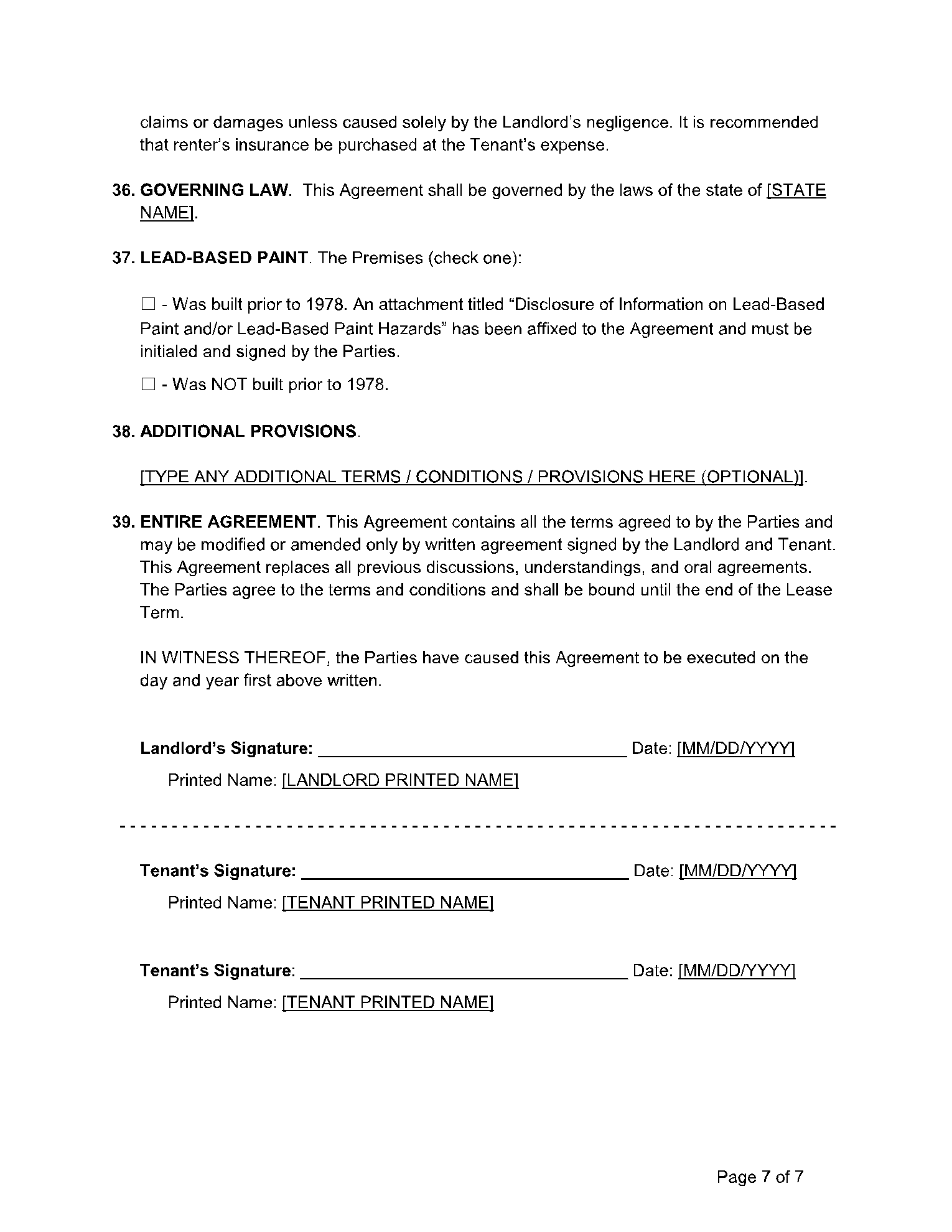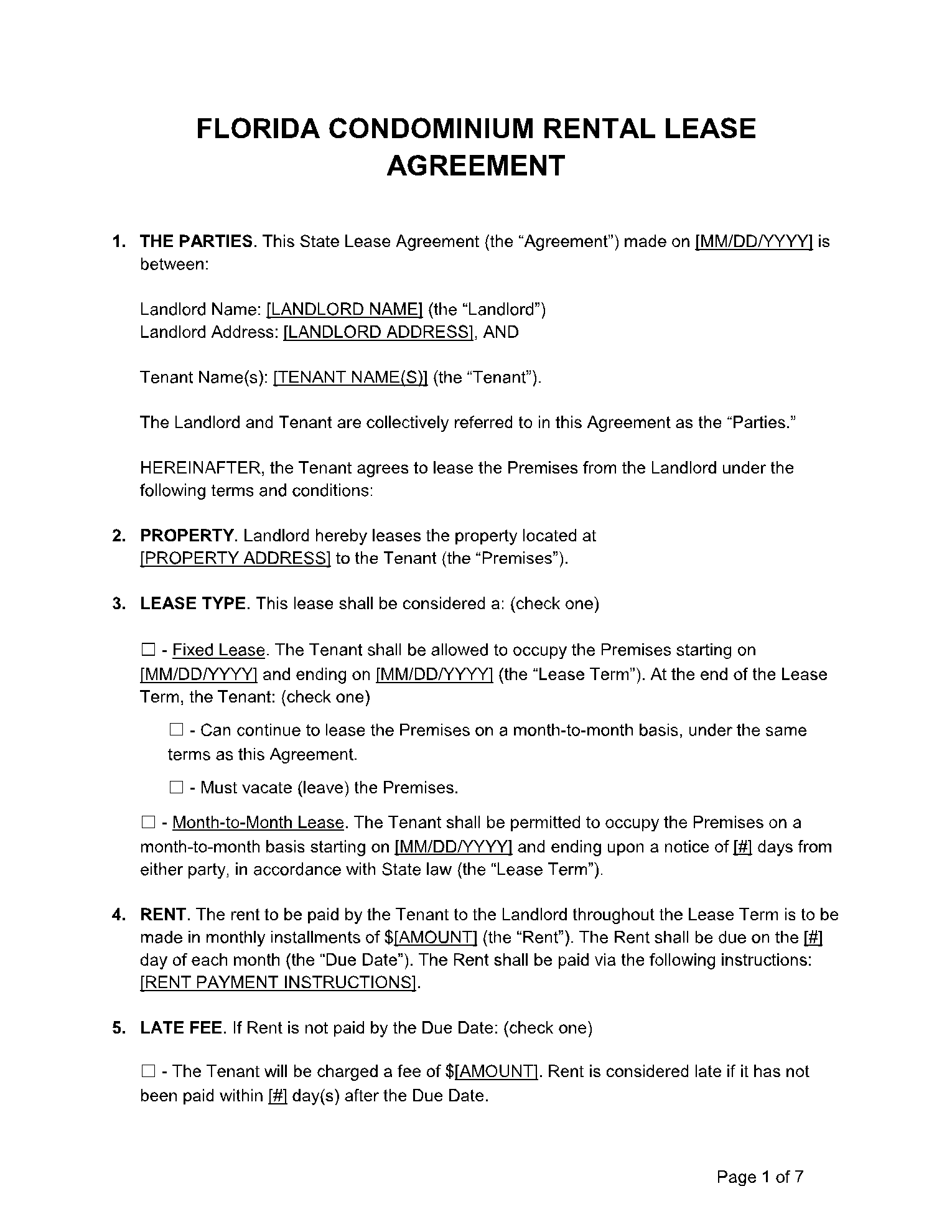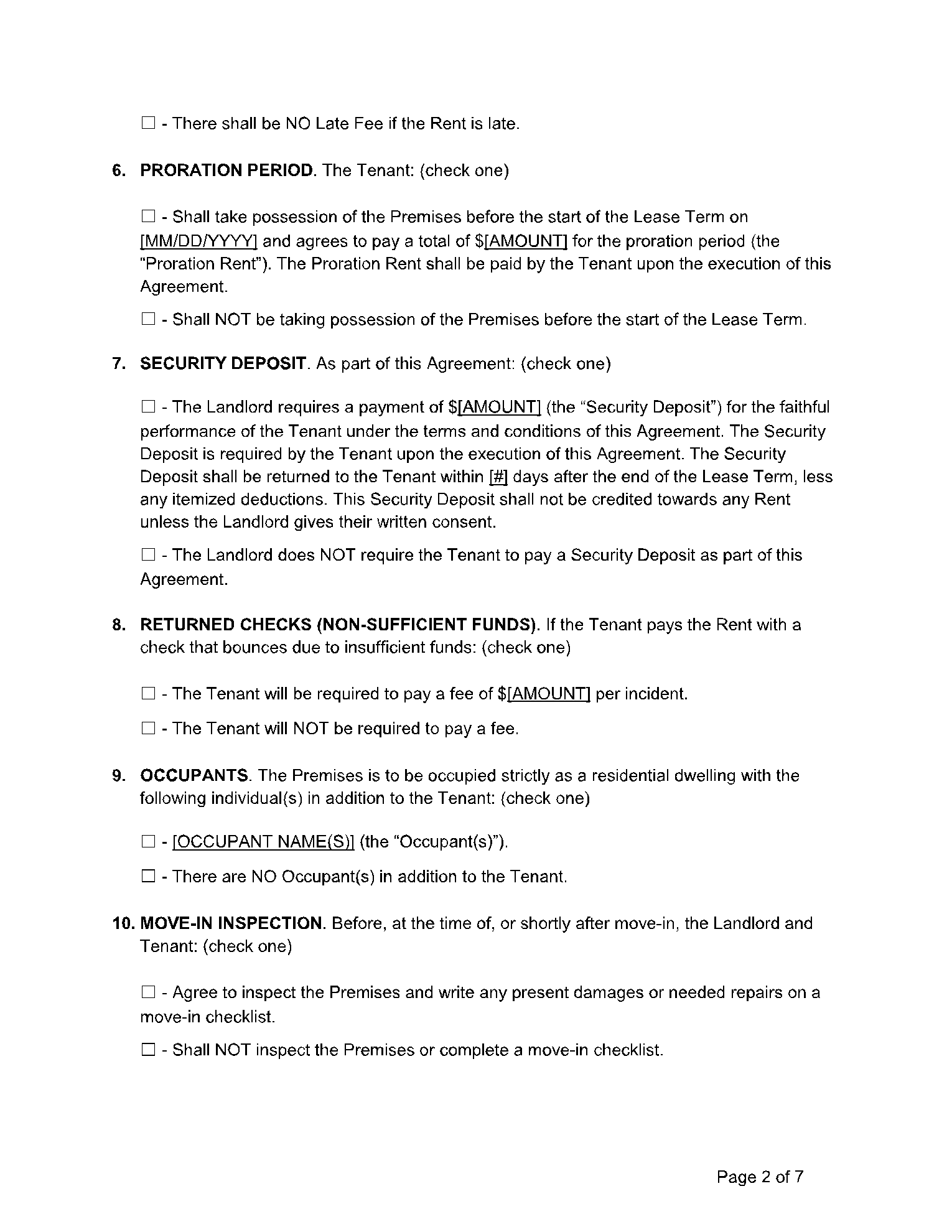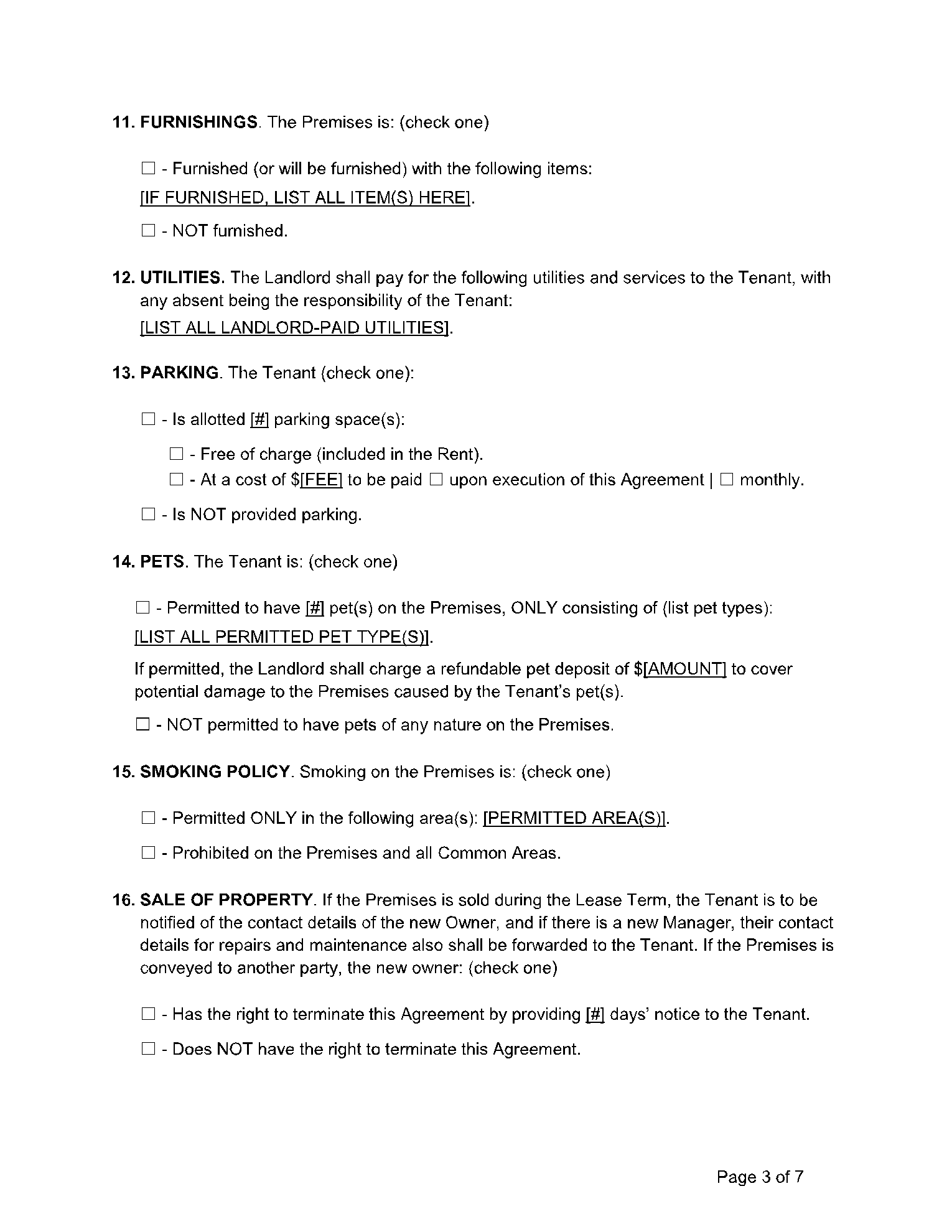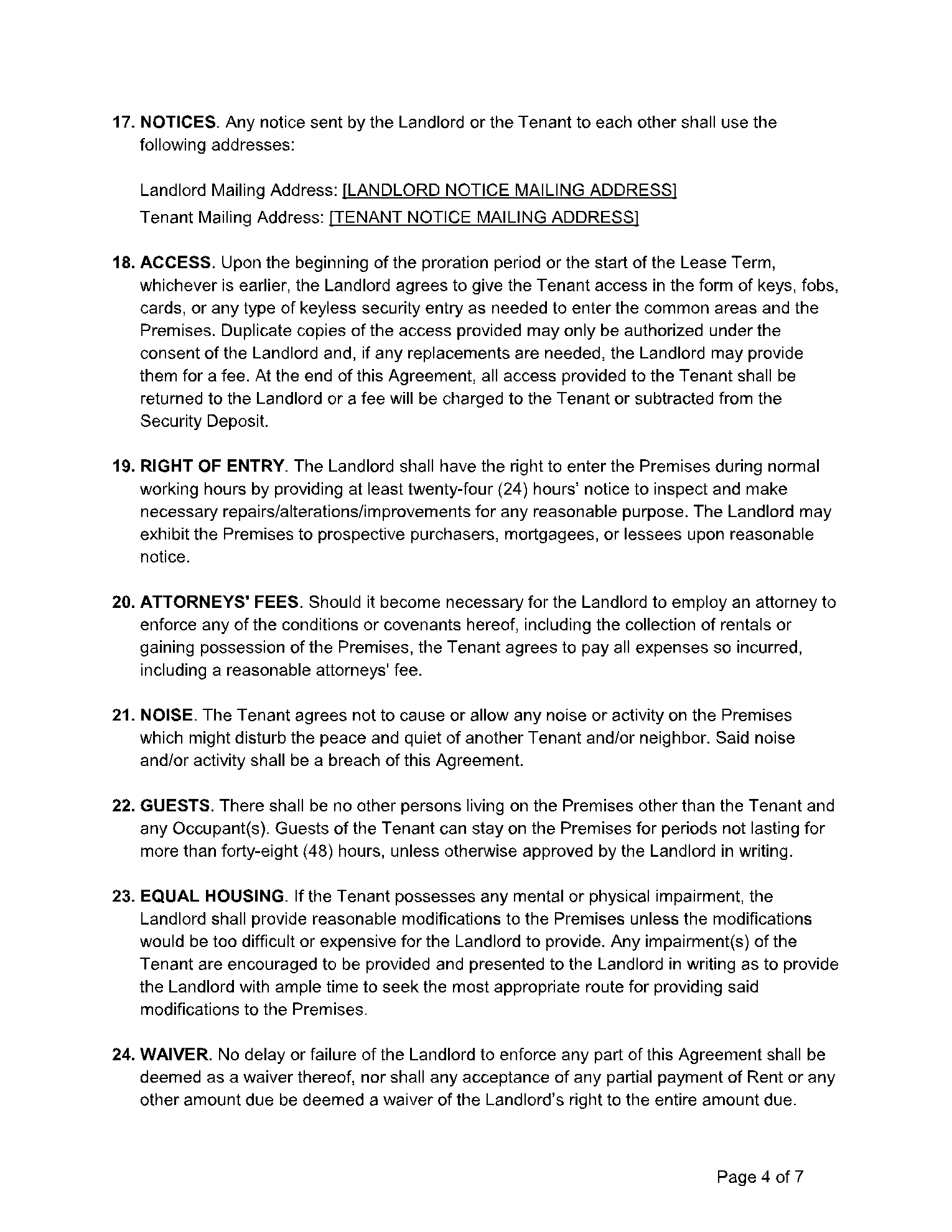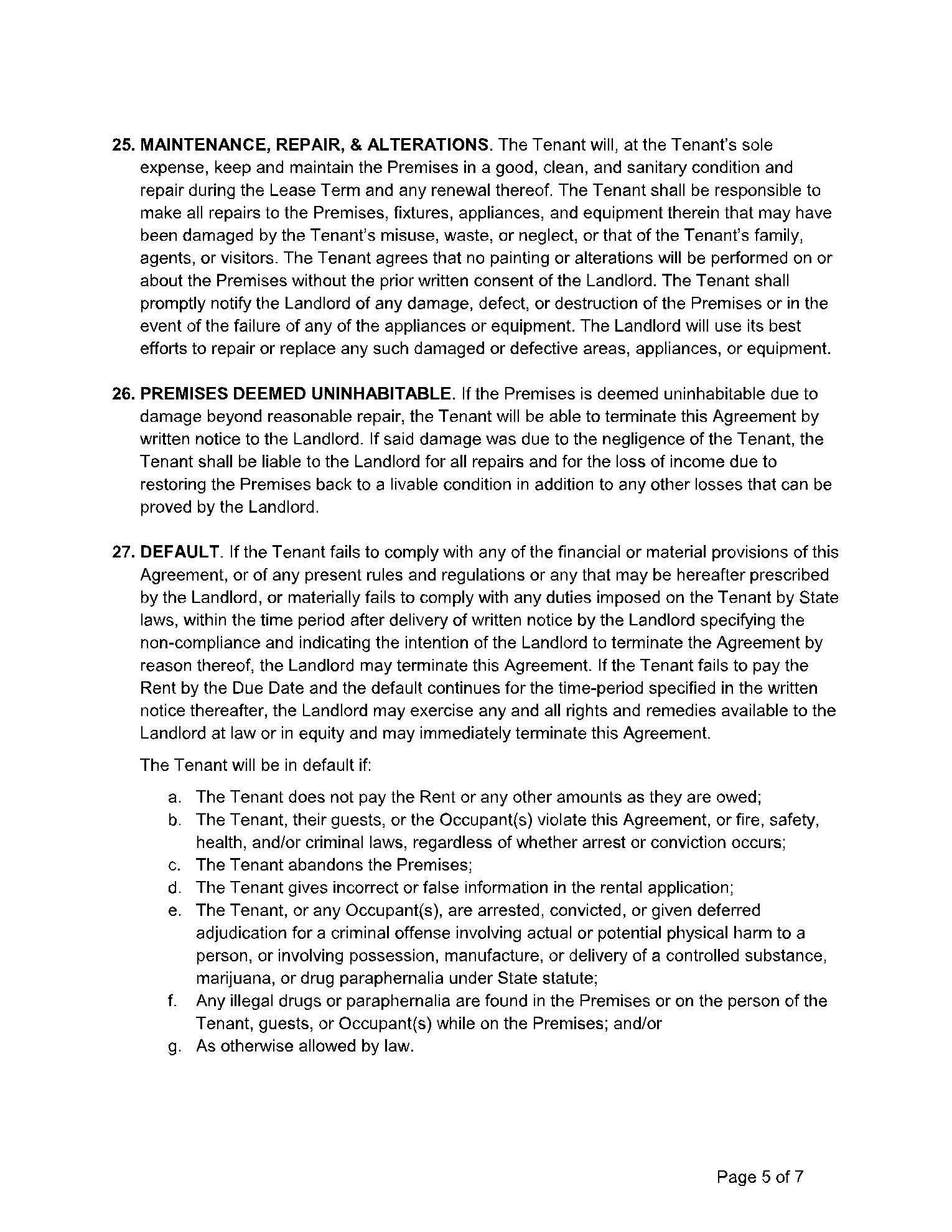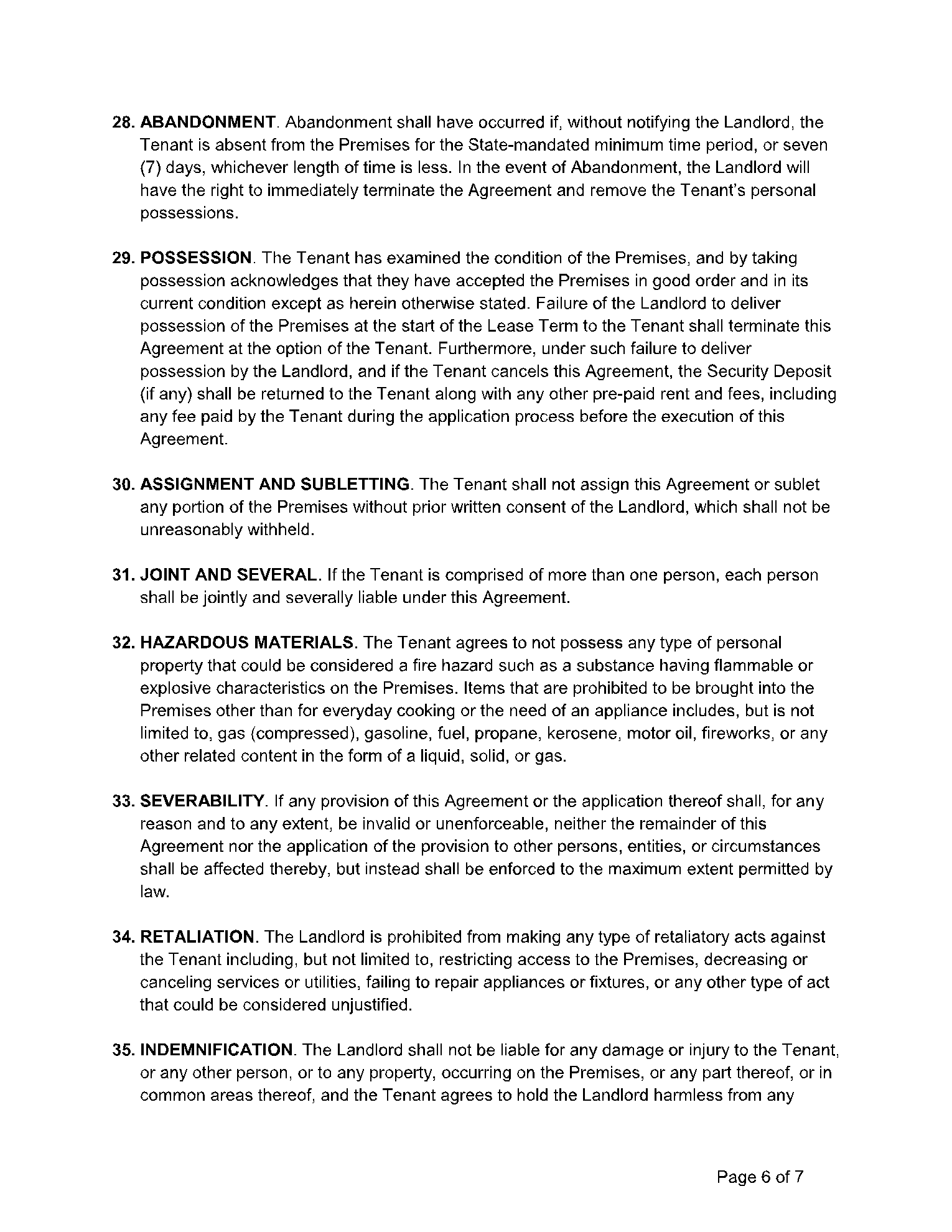Florida residential lease agreement for a unit in a condominium is a carefully drafted document, which follows the state law. Such an agreement has its specific users and uses.
While following the rules and regulations of Florida State, this agreement settles terms between the landlord and the tenant. Keep reading to know more about the Florida residential lease agreement for a unit in the condo.
What Is a Florida Residential Lease Agreement?
Florida residential lease agreement is a legal contract between a landlord and a tenant for renting any residential property. Likewise, the Florida condominium lease agreement is the residential lease designed for renting out condos. This legal contract abides by the law of Florida State and settles different terms and conditions between the parties.
The Florida residential lease agreement for the condo takes into account the concerns of all the parties involved. This includes the landlord, the tenant, and the condominium board. Finally, terms on which all the parties agree are decided.
Upon finalizing the agreement, the parties must legally follow and restrict the terms that the contract comprises of. Generally, people prefer a written agreement over verbal contracts. This is because the written agreement makes it clearer for the parties to know the terms they agree on.
The Florida condo lease agreement helps the landlord and the tenant establish a good relationship that benefits both of them. The documentation of the terms and deciding on different factors in the agreement remove the chances of any conflict. This also results in clear expectations for all parties. It is important to cover maximum things in the Florida condo lease agreement.
Download Our Florida Residential Lease Agreement Template
It's never too early or too late to embrace a brand-new leasing and renting experience using this legally sound, thorough, and simple-to-use leasing template. Download it now at no cost!
Who Needs a Florida Residential Lease Agreement?
A Florida residential lease agreement is the need of anyone wishing to rent out their property/a portion of it. Similarly, the person looking for a place to get on rent needs this agreement.
The Florida condo lease agreement specifically addresses the needs of people looking to rent a unit in a condo. This document legally binds both the landlord and the tenant into a contract where it is obligatory for them to follow the rules made by the state law of Florida.
In addition to these, a condominium owner who wishes to have a long term contract also prefers this agreement. The long term contract, as opposed to the monthly rent agreements, provides the owner with a relaxation of the time.
Likewise, tenants who want a unit in a condominium for a longer duration tend to opt for the lease agreement. This saves them the effort of renewing the agreement each month.
What You Can Use a Florida Residential Lease Agreement for?
The Florida residential lease agreement serves the purpose of establishing a good relationship between a lessor and a lessee. However, the Florida condominium lease agreement is specifically designed for condominiums. Parties use this agreement for the rent purposes of a unit/condo. The condo owners refer to this agreement when they wish to rent it out to a reliable tenant.
The Florida residential-lease agreement for a unit in condo outlines the rights/responsibilities of both the property owner and the renter. The things that the two parties agree on include expenses, rent, and sharing of utilities. The agreement finds its use in negotiation on terms like these.
One important use of the Florida residential lease agreement is to establish a long term contract between the persons. The tenant can rent a unit in a condo for at least a year. This saves both the tenant and the landlord the struggle of renewing the contract every month.
What Are Included in a Florida Residential Lease Agreement?
There are certain things that are important to include in the Florida residential lease agreement. These include:
Contact Information:
The contact information of the landlord and the tenant must appear on the Florida residential lease agreement. This helps the tenant to contact the landlord in case of an emergency.
Identifying the Condo Rented:
It is important to include details to identify the condo that is the subject of the agreement. These details include the physical address of the unit. The physical address includes the condominium number, appearing next to the unit number. Further, it includes the street number and name of condo development, where city name and zip code follow it.
Term of the Lease:
The duration for which the Florida residential lease agreement stands valid must appear clearly on the lease document. It should include the start date of the agreement and the end date. This clears out any misunderstanding regarding the tenure. Moreover, the members of the agreement know it beforehand whether they need to renew the lease or find a new place or a new tenant.
Rent:
It is important to include the clauses related to renting in the Florida residential lease agreement. The amount of the rent that the landlord demands the parties may negotiate on should appear in the lease agreement.
Moreover, the agreement document must include the date on which the rent is mandatory to pay. Some leases may have monthly rent due while some may have weekly rent due. Whatever the members of the lease decide, the document should state them clearly.
Taxes:
There are many cases where additional taxes are must for the tenant to pay. The landlord must include the tax amount that the tenant has to pay in the lease document. It is better to write this amount next to the amount of rent due.
Maintenance Charges:
The landlord and the tenant can decide among themselves for who is responsible to pay the maintenance charges of the condo. Some parties may agree on the landlord to pay the maintenance charges while some agree on the tenant.
>The lease document should state the name of the person responsible for the maintenance charges. This should come along with the amount of bills due each month or quarter of the month.
Additional Charges:
The landlord may demand additional charges from the tenant to pay. These additional charges include the security deposit, advance rent, and late charges. For example, the landlord may demand a security deposit of their choice which is mandatory for the tenant to pay.
Moreover, the lease terms may agree to advance rent or may not. If they do, it should appear on the legal document with the amount that the tenant pays. The landlord may also demand a fee from the tenant for the late payment of rent. Likewise, the landlord may demand additional for any check-bounce. All these terms are important to include in the legal document.
Use of Premises:
The portion of the premises that the tenant is allowed to use should be very clearly marked in the lease document. The document has a section to include the areas where the tenant is allowed to go and use.
Download Our Florida Residential Lease Agreement Template
It's never too early or too late to embrace a brand-new leasing and renting experience using this legally sound, thorough, and simple-to-use leasing template. Download it now at no cost!
Conclusion
The Florida residential lease agreement is the legal document to conclude terms between a tenant and a landlord, where this agreement finds its use in renting the unit in a condominium. Moreover, the terms of this agreement are included in the document after negotiation between the members.
The Florida residential lease agreement for a unit in a condo has a set validity term. Additionally, after this term, the members can renew the agreement. If you are looking for the Florida residential lease agreement template for a unit in a condo, it is available on CocoSign in addition to others.
DOCUMENT PREVIEW
Residential Lease for Unit in Condominium or Cooperative
FLORIDA ASSOCIATION OF REALTORS®
(FOR A TERM NOT TO EXCEED ONE YEAR)
(Not To Be Used For Commercial, Agricultural, or Other Residential Property)
WARNING: IT IS VERY IMPORTANT TO READ ALL OF THE LEASE CAREFULLY. THE LEASE IMPOSES IMPORTANT LEGAL OBLIGATIONS.
AN ASTERISK (*) OR A BLANK SPACE ( ) INDICATES A PROVISION WHERE A CHOICE OR A DECISION MUST BE MADE BY THE PARTIES. NO CHANGES OR ADDITIONS TO THIS FORM MAY BE MADE UNLESS A LAWYER IS CONSULTED.
I. TERM AND PARTIES. This is a lease (“the Lease”) for a period of months (the “Lease Term”), beginning
[number] [month, day, year]
and ending , between
[month, day, year] [name of owner of the property]
and . (In the Lease, the owner, whether one or more, of the
[name(s) of person(s) to whom the property is leased]
property is called “Landlord.” All persons to whom the property is leased are called “Tenant.”)
II. PROPERTY RENTED. Landlord leases to Tenant unit no. in the building located at ,
[street address]
known as , , Florida ,
[name of condominium development] [city] [zip code]
together with the following furniture and appliances:
[List all furniture and appliances. If none, write “none.”] (In the Lease the property leased, including furniture and appliances, if any, is called “the Premises.”)
III. COMMON AREAS. Landlord grants to Tenant permission to use, along with others, the common areas of the building and the development of which the Premises are a part.
IV. RENT PAYMENTS AND CHARGES. Tenant shall pay rent for the Premises in installments of $ each on the
day of each . (A “Rental Installment Period,” as used in the Lease, shall be a month if rent is paid monthly,
[month, week]
and a week if rent is paid weekly.) Tenant shall pay with each rent payment all taxes imposed on the rent by taxing authorities. The amount of taxes payable on the beginning date of the Lease is $ for each installment. The amount of each installment of rent plus taxes (“the Lease Payment”), as of the date the Lease begins, is $ . Landlord will notify Tenant if
the amount of the tax changes. Tenant shall pay the rent and all other charges required to be paid under the Lease by cash, valid check, or money order. Landlord may appoint an agent to collect the Lease Payment and to perform Landlord’s obligations.
* Landlord / Tenant (circle one) shall pay the common area maintenance fees attributable to the Premises during the Lease Term. Such fees are $
 per month / quarter (circle one) and are payable at the following address:
per month / quarter (circle one) and are payable at the following address:
. Failure by Tenant to pay any such fees that are Tenant’s obligations shall be a default in payment of rent.
 The Lease Payments must be paid in advance / in arrears (circle one) beginning .
The Lease Payments must be paid in advance / in arrears (circle one) beginning .
[date]
V. DEPOSITS, ADVANCE RENT, AND LATE CHARGES. In addition to the Lease Payments described above, Tenant shall pay the following: (check only those items that apply)
a security deposit of $ to be paid upon signing the Lease.
advance rent in the amount of $ for the Rental Installment Periods of
to be paid upon signing the Lease.
a pet deposit in the amount of $ to be paid upon signing the Lease.
a late charge in the amount of $ for each Lease Payment made more than _number of days after the date it is due.
a bad check fee in the amount of $ (not to exceed $20.00, or 5% of the Lease Payment, whichever is greater) if Tenant makes any Lease Payment with a bad check. If Tenant makes any Lease Payment with a bad check, Landlord can require Tenant to pay all future Lease Payments in cash or by money order.
VI. SECURITY DEPOSITS AND ADVANCE RENT. If Tenant has paid a security deposit or advance rent the following provisions apply:
A. Landlord shall hold the money in a separate interest-bearing or noninterest-bearing account in a Florida banking institution for the benefit of Tenant.
RLCC-1 9/92 Approved for use under rule 10-1.1(b) of The Rules Regulating The Florida Bar
If Landlord deposits the money in an interest-bearing account, Landlord must pay Tenant interest of at least 75% of the annualized average interest paid by the bank or 5% per year simple interest, whichever Landlord chooses. Landlord cannot mix such money with any other funds of Landlord or pledge, mortgage, or make any other use of such money until the money is actually due to Landlord; or
B. Landlord must post a surety bond in the manner allowed by law. If Landlord posts the bond, Landlord shall pay Tenant 5% interest per year.
At the end of the Lease, Landlord will pay Tenant, or credit against rent, the interest due to Tenant. No interest will be due Tenant if Tenant wrongfully terminates the Lease before the end of the Lease Term.
If Landlord rents five or more dwelling units, then within 30 days of Tenant’s payment of the advance rent or any security deposit, Landlord must notify Tenant in writing of the manner in which Landlord is holding such money, the interest rate, if any, that Tenant will receive, and when such payments will be made.
VII. NOTICES. is Landlord’s Agent. All notices to Landlord and
[name]
all Lease Payments must be sent to Landlord’s Agent at ,
[address]
unless Landlord gives Tenant written notice of a change. Landlord’s Agent may perform inspections on behalf of Landlord. All notices to Landlord shall be given by certified mail, return receipt requested, or by hand delivery to Landlord or Landlord’s Agent.
Any notice to Tenant shall be given by certified mail, return receipt requested, or delivered to Tenant at the Premises. If Tenant is absent from the
Premises, a notice to Tenant may be given by leaving a copy of the notice at the Premises.
VIII. USE OF PREMISES. Tenant shall use the Premises only for residential purposes. Tenant also shall obey, and require anyone on the Premises to obey, all laws and any restrictions that apply to the Premises. Landlord will give Tenant notice of any restrictions that apply to the Premises.
The Premises are located in a condominium or cooperative development. The Lease, and Tenant’s rights under the lease, shall be subject to all terms, conditions, provisions, and restrictions set out in the Declaration of Condominium, the plat, and restrictions, rules, and regulations as now exist or may be adopted, modified, amended, or repealed by the governing association during the Lease Term.
Tenant acknowledges that the governing association may adopt, modify, amend, or repeal rules and regulations for the use of the common areas and the Premises during the Lease Term.
 Occasional overnight guests are / are not (circle one) permitted. An occasional overnight guest is one who does not stay more than nights in any calendar month. Landlord’s written approval is / is not (circle one) required to allow anyone else to occupy the Premises.
Occasional overnight guests are / are not (circle one) permitted. An occasional overnight guest is one who does not stay more than nights in any calendar month. Landlord’s written approval is / is not (circle one) required to allow anyone else to occupy the Premises.
 Tenant may / may not (circle one) keep or allow pets or animals on the Premises without Landlord’s approval of the pet or animal in writing.
Tenant may / may not (circle one) keep or allow pets or animals on the Premises without Landlord’s approval of the pet or animal in writing.
Tenant shall not keep any dangerous or flammable items that might increase the danger of fire or damage on the Premises without Landlord’s consent. Tenant shall not create any environmental hazards on or about the Premises.
Tenant shall not destroy, deface, damage, impair, or remove any part of the Premises belonging to Landlord, nor permit any person to do so.
 Tenant may / may not (circle one) make any alterations or improvements to the Premises without first obtaining Landlord’s written consent to the alteration or improvement.
Tenant may / may not (circle one) make any alterations or improvements to the Premises without first obtaining Landlord’s written consent to the alteration or improvement.
Tenant must act, and require all other persons on the Premises to act, in a manner that does not unreasonably disturb any neighbors or constitute a breach of the peace.
IX. MAINTENANCE. Landlord and Tenant agree that the maintenance of the Premises must be performed by the person indicated below:
A. Structural and Building Codes. Landlord and Tenant acknowledge that the maintenance of the structural elements and common areas is performed by the condominium association as part of the common area maintenance. Landlord shall assure that the association complies with applicable building, housing, and health codes relating to the Premises. If there are no applicable building, housing, or health codes, Landlord shall assure that the association maintains and repairs the roofs, porches, windows, exterior walls, screens, foundations, floors, structural components, and steps and keeps the plumbing in reasonable working order. Landlord will be responsible for the maintenance of any items listed above for which the association is not responsible.
 B. Elective Maintenance. Fill in each blank space in this section with Landlord or Tenant to show who will take care of the item noted. If a space is left blank. Landlord will be required to take care of that item.
B. Elective Maintenance. Fill in each blank space in this section with Landlord or Tenant to show who will take care of the item noted. If a space is left blank. Landlord will be required to take care of that item.
1. comply with all obligations imposed upon tenants by applicable provisions of building, housing, and health codes;
2. keep the Premises clean and sanitary;
3. remove all garbage from the dwelling unit in a clean and sanitary manner;
4. keep all plumbing fixtures in the dwelling unit clean, sanitary, and in repair; and
5. use and operate in a reasonable manner all electrical, plumbing, sanitary, heating, ventilating, air conditioning, and other facilities and appliances, including elevators.
X. UTILITIES. Tenant shall pay all charges for hook-up, connection, and deposit for providing all utilities and utility services to the Premises during this lease except
, which Landlord agrees to provide at Landlord’s expense. (Specify any utilities to be provided and paid for by Landlord such as water, sewer, oil, gas, electricity, telephone, garbage removal, etc.)
XI. LANDLORD’S ACCESS TO PREMISES. Landlord or Landlord’s Agent may enter the Premises in the following circumstances: A. At any time for the protection or preservation of the Premises.
B. After reasonable notice to Tenant at reasonable times for the purpose of repairing the Premises.
C. To inspect the Premises; make necessary or agreed-upon repairs, decorations, alterations, or improvements; supply agreed services; or exhibit the
Premises to prospective or actual purchasers, mortgagees, tenants, workers, or contractors under any of the following circumstances:
1. with Tenant’s consent;
2. in case of emergency;
3. when Tenant unreasonably withholds consent; or
4. if Tenant is absent from the Premises for a period of at least one-half a Rental Installment Period. (If the rent is current and Tenant notifies
Landlord of an intended absence, then Landlord may enter only with Tenant’s consent or for the protection or preservation of the Premises.)
XII. PROHIBITED ACTS BY LANDLORD.
A. Landlord cannot cause, directly or indirectly, the termination or unreasonable interruption of any utility service furnished to Tenant, including, but not limited to, water, heat, light, electricity, gas, elevator, garbage collection, or refrigeration (whether or not the utility service is under the control of, or payment is made by, Landlord).
B. Landlord cannot prevent Tenant’s access to the Premises by any means, including, but not limited to, changing the locks or using any bootlock or similar device.
C. Landlord cannot remove the outside doors, locks, roof, walls, or windows of the Premises except for purposes of maintenance, repair, or replacement. Landlord cannot remove Tenant’s personal property from the Premises unless the action is taken after surrender, abandonment, or a lawful eviction. If provided in a written agreement separate from the Lease, upon surrender or abandonment by Tenant, Landlord shall not be liable or responsible for storage or disposition of Tenant’s personal property. (For the purposes of this section, abandonment means Tenant is absent from the Premises for at least one-half a Rental installment Period without paying rent or giving Landlord reasonable notice of Tenant’s absence.)
XIII. CASUALTY DAMAGE. If the Premises are damaged or destroyed other than by wrongful or negligent acts of Tenant or persons on the Premises with Tenant’s consent, so that the use of the Premises is substantially impaired, Tenant may terminate the Lease within 30 days after the damage or destruction and Tenant will immediately vacate the premises. If Tenant vacates, Tenant is not liable for rent that would have been due after the date of termination. Tenant may vacate the part of the Premises rendered unusable by the damage or destruction, in which case Tenant’s liability for rent shall be reduced by the fair rental value of the part of the Premises that was damaged or destroyed.
XIV. DEFAULT.
A. Landlord’s Default. Except as noted below, Landlord will be in default if Landlord fails to comply with Landlord’s required maintenance obligations under Section IX(A) or fails to comply with other material provisions of the Lease and such failure continues for more than 7 days after Tenant delivers a written notice to Landlord that tells Landlord how Landlord has violated the Lease.
If Landlord’s failure to comply is due to causes beyond the Landlord’s control and if Landlord has made, and continues to make, every reasonable effort to correct the problem, the Lease may be altered by the parties, as follows:
1. If Landlord’s failure to comply makes the Premises uninhabitable and Tenant vacates, Tenant shall not be liable for rent during the period the
Premises remains uninhabitable.
2. If Landlord’s failure to comply does not make the Premises uninhabitable and Tenant continues to occupy the Premises, the rent for the period of noncompliance will be reduced by an amount in proportion to the loss of rental value caused by the noncompliance.
B. Tenant’s Default. Tenant will be in default if any of the following occur:
1. Tenant fails to pay rent when due and the default continues for 3 days, excluding Saturday, Sunday, and legal holidays, after delivery of written demand by Landlord for payment of the rent or possession of the Premises.
2. Tenant fails to perform its obligations under the Lease, and the failure is such that Tenant should not be given an opportunity to correct it or the failure occurs within 12 months of a written warning by Landlord of a similar failure. Examples of such failures which do not require an opportunity to correct include, but are not limited to, destruction, damage, or misuse of Landlord’s or other Tenant’s property by an intentional act or a subsequent or continued unreasonable disturbance.
3. Except as provided above, Tenant fails to perform any other obligation under the Lease and the default continues for more than 7 days after delivery of written notice to Tenant from Landlord specifying the default.
C. Waiver of Default. If Landlord accepts rent knowing of Tenant’s default or accepts performance by Tenant of any provision of the Lease different from the performance required by the Lease, or if Tenant pays rent knowing of Landlord’s default or accepts performance by Landlord of any provision of the Lease different from the performance required by the Lease, the party accepting the rent or performance or making the payment shall not have the right to terminate the Lease or to bring a lawsuit for that default, but may enforce any later default.
XV. REMEDIES AND DEFENSES.
A. Tenant’s Remedies.
1. If Landlord has defaulted under the Lease and if Tenant has given Landlord a written notice describing the default and Tenant’s intention to withhold rent if the default is not corrected within 7 days, Tenant may withhold an amount of rent equal to the loss in rental value caused by the default. If Tenant’s notice advises Landlord that Tenant intends to terminate the lease if the default is not cured within 7 days and the default is not cured within the 7 days, Tenant may terminate the Lease.
2. If Tenant has given the notice referred to in subparagraph (1) above, and if Landlord has not corrected the default within 7 days, Tenant may, in addition to withholding the applicable amount of rent, file a lawsuit in county court to require Landlord to correct the default and for damages.
3. If Landlord’s default makes the Premises uninhabitable, and if Tenant has given Landlord a notice describing the default and informing Landlord that Tenant intends to terminate the Lease, then if Landlord does not cure the default within the 7-day period, Tenant may terminate the Lease at the end of the 7 days.
4. If Landlord violates the provisions of section XII, Landlord shall be liable to Tenant for actual and consequential damages or 3 months’ rent, whichever is greater, for each violation.
B. Landlord’s Remedies.
1. If Tenant remains on the Premises after expiration or termination of the Lease without Landlord’s permission, Landlord may recover possession of the Premises in the manner provided for by law. Landlord also may recover double rent for the period during which Tenant refuses to vacate the Premises.
2. If Tenant defaults under the Lease by failing to pay rent, as set forth in section XIV(B)(1), Landlord may terminate Tenant’s rights under the Lease and Tenant shall vacate the Premises immediately. If Tenant defaults under the Lease for any other reason, as set forth in sections XIV(B)(2) or (3) above, Landlord may terminate Tenant’s rights under the Lease and Tenant shall vacate the Premises within 7 days of delivery of the notice of termination.
3. If Tenant fails to cure a default within the time specified in the notice to Tenant, Landlord may recover possession of the Premises as provided by law.
4. Landlord shall not recover possession of the Premises except:
a. in a lawsuit for possession;
b. when Tenant has surrendered possession of the Premises to Landlord; or
c. when Tenant has abandoned the Premises. Absent actual knowledge of abandonment, the Premises shall be considered abandoned if Tenant is absent from them for at least one-half a Rental Installment Period, the rent is not current, and Tenant has not notified Landlord, in writing, of an intended absence.
5. If Tenant has defaulted under the Lease and Landlord has obtained a writ of possession, if Tenant has surrendered possession of the Premises to
Landlord, or if Tenant has abandoned the Premises, Landlord may:
a. treat the Lease as terminated, retake possession for Landlord’s own account, and any further liability of Tenant will be ended;
b. retake possession of the Premises for Tenant’s account. Tenant will remain liable for the difference between rent agreed to be paid under the
Lease and rent Landlord is able to recover in good faith from a new tenant; or c. do nothing, and Tenant will be liable for the rent as it comes due.
6. If Landlord retakes possession of the Premises for Tenant’s account, Landlord must make a good faith effort to re-lease the Premises. Any rent received by Landlord as a result of the new lease shall be deducted from the rent due from Tenant. For purposes of this section, “good faith” in trying to re-lease the Premises means that Landlord shall use at least the same efforts to re-lease the Premises as were used in the initial rental or at least the same efforts as Landlord uses in attempting to lease other similar property. It does not require Landlord to give a preference in leasing the Premises over other vacant properties that Landlord owns or has the responsibility to rent.
C. Other Remedies. Each party also may have other remedies available at law or in equity.
D. Defenses. In a lawsuit by Landlord for possession of the Premises based upon nonpayment of rent or in a lawsuit by Landlord seeking to obtain unpaid rent, Tenant may assert as a defense Landlord’s failure to perform required maintenance, as set forth in Section IX(A) above. Landlord’s failure to provide elective maintenance, as set forth in Section IX(B) above, shall not be a defense to any lawsuit by Landlord for possession of the Premises unless otherwise provided by the Lease or applicable law. Tenant may also raise any other defense, whether legal or equitable, that Tenant may have, including the defense or retaliatory conduct.
E. Payment of Rent to Court. In any lawsuit by Landlord for possession of the Premises, if Tenant raises any defense other than payment, Tenant must pay into the registry of the court the past due rent set forth in Landlord’s complaint, or an amount determined by the court, and the rent which comes due during the lawsuit, as it comes due. Failure of Tenant to pay the rent into the registry of the court will be a waiver of Tenant’s defenses other than payment.
F. Attorney’s Fees. In any lawsuit brought to enforce the Lease or under applicable law, the party who wins may recover its reasonable court costs and attorneys’ fees from the party who loses.
XVI. ASSIGNMENT AND SUBLEASING. Tenant may / may not (circle one) assign the Lease or sublease all or any part of the Premises without first obtaining Landlord’s written approval and consent to the assignment or sublease.
 XVII. RISK OF LOSS. Landlord shall / shall not (circle one) be liable for any loss by reason of damage, theft, or otherwise to the contents, belongings, and personal effects of the Tenant, or Tenant’s family, agents, employees, guests, or visitors located in or about the Premises, or for damage or injury to Tenant or Tenant’s family, agents, employees, guests, or visitors. Landlord shall not be liable if such damage, theft, or loss is caused by Tenant, Tenant’s family, agents, employees, guests, or visitors. Nothing contained in this provision shall relieve Landlord or Tenant from responsibility for loss, damage, or injury caused by its own negligence or willful conduct.
XVII. RISK OF LOSS. Landlord shall / shall not (circle one) be liable for any loss by reason of damage, theft, or otherwise to the contents, belongings, and personal effects of the Tenant, or Tenant’s family, agents, employees, guests, or visitors located in or about the Premises, or for damage or injury to Tenant or Tenant’s family, agents, employees, guests, or visitors. Landlord shall not be liable if such damage, theft, or loss is caused by Tenant, Tenant’s family, agents, employees, guests, or visitors. Nothing contained in this provision shall relieve Landlord or Tenant from responsibility for loss, damage, or injury caused by its own negligence or willful conduct.
XVIII. SUBORDINATION. The Lease is subordinate to the lien of any mortgage encumbering the fee title to the Premises from time to time.
XIX. LIENS. Tenant shall not have the right or authority to encumber the Premises or to permit any person to claim or assert any lien for the improvement or repair of the Premises made by Tenant. Tenant shall notify all parties performing work on the Premises at Tenant’s request that the Lease does not allow any liens to attach to Landlord’s interest.
*XX. APPROVAL CONTINGENCY. The Lease is / is not (circle one) conditioned upon approval of Tenant by the association that governs the Premises.
XXI. RENEWAL/EXTENSION. The Lease can be renewed or extended only by a written agreement signed by both Landlord and Tenant, but no renewal
may extend the term to a date more than 1 year after the lease begins. A new lease is required for each year.
XXII. MISCELLANEOUS.
A. Time is of the essence of the Lease.
B. The Lease shall be binding upon and for the benefit of the heirs, personal representatives, successors, and permitted assigns of Landlord and Tenant, subject to the requirements specifically mentioned in the Lease. Whenever used, the singular number shall include the plural or singular and the use of any gender shall include all appropriate genders.
C. The agreements contained in the Lease set forth the complete understanding of the parties and may not be changed or terminated orally. D. No agreement to accept surrender of the Premises from Tenant will be valid unless in writing and signed by Landlord.
E.. All questions concerning the meaning, execution, construction, effect, validity, and enforcement of the Lease shall be determined pursuant to the laws of Florida.
F. The place for filing any suits or other proceedings with respect to the Lease shall be the county in which the Premises is located. G. Landlord and Tenant will use good faith in performing their obligations under the Lease.
